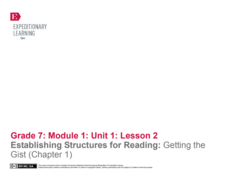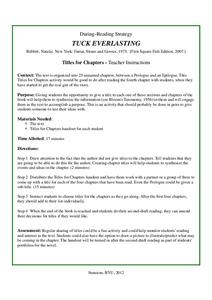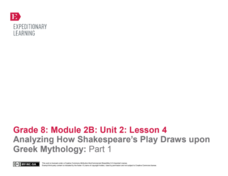EngageNY
Establishing Structures for Reading: Getting the Gist (Chapter 1)
Class members review expectations for successful discussions before reading chapter one of A Long Walk to Water by Linda Sue Park. They engage in a think-pair-share to discuss the gist of the text and add their thoughts to their Readers'...
Novelinks
Tuck Everlasting: Titles for Chapters
High schoolers synthesize the information they've learned from each chapter of Natalie Babbitt's Tuck Everlasting with a creative summarizing activity. With a graphic organizer for all of the book's chapters, readers title...
EngageNY
Reading an Interview: “Sloth Canopy Researcher: Bryson Voirin”
It's time to slow down and learn about sloths! Scholars read the first few questions of an interview with a sloth canopy researcher, looking for the gist. Next, they create a glossary in the back of their journals to add new scientific...
EngageNY
Summarizing Informational Text: “Hawaii’s Endangered Happy Face Spider”
Put on a happy face. Using an interesting resource, pupils read an informational text about Hawaii's endangered Happy Face Spider. Next, they participate in a jigsaw discussion to find the gist of the article.
Curated OER
My Antonia: Magic Squares (Vocabulary Strategy)
Help your pupils discover the power of context clues by teaching the this vocabulary strategy. Designed to go with words from Willa Cather's My Antonia, this exercise focuses on having individuals use their own words to define new...
EngageNY
Researching about the Red Cross: What Is a Multinational Aid Organization?
Lend a helping hand. Pupils read two informational articles about international aid organizations and how they help areas affected by natural disasters. Scholars attempt to uncover the gist of each text, discussing their thoughts in...
EngageNY
Analyzing How Shakespeare’s Play Draws upon Greek Mythology: Part 1
Scholars read the story "Pyramus and Thisbe," analyzing word choice, tone, and meaning. They then try to find the gist of the story and discuss how Shakespeare used the myth in his play A Midsummer Night's Dream.






